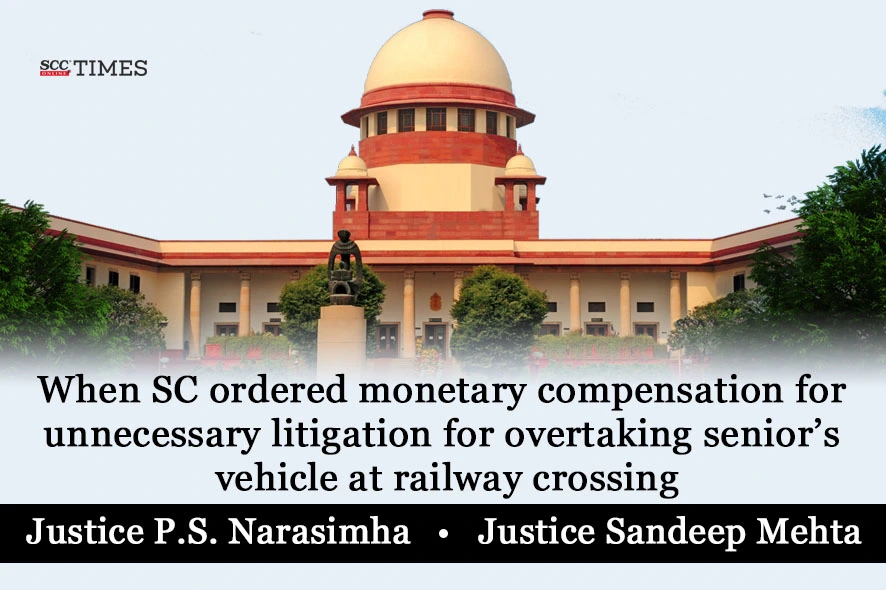Supreme Court: The instant appeal was filed by the appellant who was admonished for overtaking his senior’s vehicle at railway crossing, seeking compensation for a wrongful order and expressing dissatisfaction at the quashment of order of admonition against him; the Division Bench of PS Narasimha* and Sandeep Mehta, JJ., observed that when the institutions that grow beyond proportion, officers act mechanically and many a times helplessly, ignore the simple and readily available remedies that are available in normal lives.
The Court further observed that small excesses like overtaking the vehicle of one’s senior at a railway crossing may be an incident of indiscipline in defense services, but the balance and proportion that needs to be maintained between such an infraction and its punishment will always be at the core of good governance. “If the balance is not maintained, the distinction between bad governance, impropriety, unfairness and inhuman treatment is not much”.
Background:
The appellant was enrolled in the Indian Air Force in 1997 as Airman in the trade of Radar Fitter and at the relevant time, he was posted on the strength of 333 TRU C/o 5 FBSU, Air Force where he commenced work from 16-11-2009.
On 17-05-2010, when the appellant was returning home from duty. On his way back, he had stop at a railway crossing in a civil area which was closed due to transit of a train. The allegation against the appellant was that, instead of waiting behind the vehicles already in line at the railway crossing, he overtook all the vehicles, went straight ahead and parked his motorcycle in front of the railway gate.
A Squadron Leader (Respondent 7), who was also waiting for the railway barrier to open, approached the appellant and in ‘exercise of the responsibility’ conferred on officers of the Air Forces questioned the appellant for overtaking all vehicles, pulled out the motorcycle keys and directed him to park his motorcycle in Guard Room. The appellant’s motorcycle was confiscated for not following good order and Air Force discipline. This led to an argument between the appellant and Respondent 7 wherein the appellant allegedly used insubordinate language.
Respondent 7 ordered closed arrest of the appellant and informed the Commanding Officer and the Adjutant of the Unit. Charge sheet for two offences, i.e. “Violation of good order and Air Force Discipline” and “Use of insubordinate language to a superior officer” was drawn against the appellant.
The appellant preferred a statutory complaint which led to a formal investigation. However, it was reported that the allegations made by the appellant were false.
The appellant was however assured that punishment dated 18-05-2010 would be cancelled and the Admonition entry will be expunged from the record. However, the same was not given effect to and proceedings against appellant started and a second admonition order was passed.
Being aggrieved, the appellant approached the Armed Forces Tribunal by filing an Original Application. After hearing the appellant and the respondents and having gone through the materials and records before it, the Tribunal set aside the punishment of ‘Admonition observing that permitting a trivial happening to escalate out of proportion, could not be appreciated. The Tribunal also took note of the vindictiveness with which the respondents proceeded against the appellant.
Court’s Assessment:
Perusing the matter, the Court noted that from the findings of the Armed Forces Tribunal, it was apparent that Respondent 7 took the incident personally and forcefully confiscated the keys of the motorcycle and ordered the appellant to report to the Guard room.
The Court further noted the Tribunal deprecating the conduct of Respondent 7 for adopting such a severe action over a trivial issue, opining that the officer of a rank of Squadron Leader could have given a proper advice to the appellant, to rectify his actions, keeping in view the high discipline and dignity of Airforce. It was further noted that as per Tribunal’s conclusion, the appellant was subjected to harassment and humiliation giving an impression of vindictiveness at the instance of the concerned officers. However, the Tribunal did not grant any compensation to the appellant.
The Court noted that the initial service of the appellant for 14 long years, from its commencement in 1997 to 2011 was unblemished. From the afore-stated unfortunate incident, the appellant’s life was embroiled in defending in the disciplinary proceedings and contesting the case before the Tribunal. The disproportionate measure adopted by the respondents, the assurance of expunging the admonition, withdrawal of the same and then the retrial, leading to imposition of the punishment caused great amount of distress.
The Court said that, “The findings of the Tribunal are categorical. It found that the matter was escalated beyond proportion and there is also an element of vindictiveness in the action taken against the appellant. More than anything, the lone battle of the appellant against the unfair and arbitrary treatment meted out to him, we think is the cause and reason for the indignation”.
The Court further said that, “We are now called upon to assess the economic value of the indignity and proceed to grant monetary compensation to him. We are aware of how insignificant the monetary value of loss of dignity could be, but legal remedies that they are, enable us to settle it only as a measure, a token of our concern and in recognition of a citizen’s identity and dignity”.
Hence, the Court directed the respondents to pay an amount of Rs. 1 lakh to the appellant towards compensation for having suffered an unnecessary and a long drawn litigation that was foisted on him.
CASE DETAILS
| Citation: 2024 SCC OnLine SC 2984 Appellants : Respondents : |
Advocates who appeared in this case For Petitioner(s): For Respondent(s): |
CORAM :









